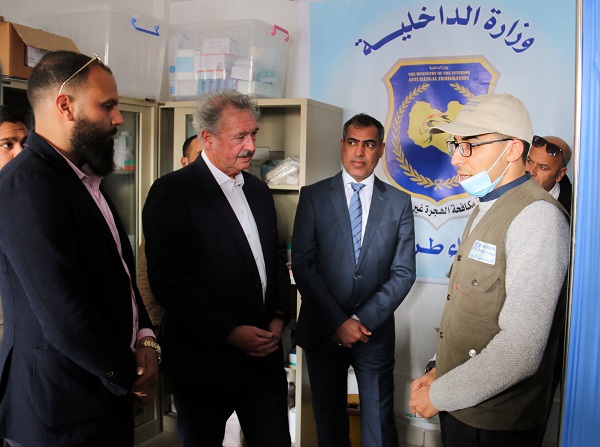 Minister Asselborn at the Tarek Al Matar refugee centre;
Credit: MAEE
Minister Asselborn at the Tarek Al Matar refugee centre;
Credit: MAEE
At the invitation of the Libyan government of national agreement, Luxembourg's Minister of Foreign and European Affairs, and Minister of Immigration and Asylum, Jean Asselborn, went to Tripoli in Libya on Monday 5 February 2018.
As the country is going through a serious political and security crisis and faces considerable challenges in terms of migration, Minister Asselborn met with Libyan Foreign Minister Mohammed Taher Syala in Tripoli and was able to meet the day before in Tunis with the Special Representative of the UN Secretary-General for Libya, Ghassan Salamé.
During his trip to Tripoli, Minister Asselborn went to the Tarek Al Matar detention centre to discover the conditions of life and detention of the detainees in this centre. He was also able to attend the embarkation of migrants for voluntary return flights to Senegal and Cameroon organised with the help of the International Organization for Migration (IOM), in a hangar on the outskirts of the airport of the Libyan capital. There the Minister met with representatives of the United Nations High Commissioner for Refugees (UNHCR) and the IOM and was able to collect testimonies of several people who arrived in Libya, especially from Eritrea and West African countries.
"The problem of migration in Libya will not be solved until the country regains some political stability," said Minister Asselborn, stressing the need for a unified and legitimate government, able to ensure the smooth operation of state and public services. To this end, Minister Asselborn reaffirmed the full support of Luxembourg and the EU to the efforts of UN Envoy Ghassan Salamé: "The three imperatives are to endow the country with a constitution, hold credible legislative elections and presidential elections and to work for national reconciliation".
During his field visit, the Minister noted that the living conditions of migrants, particularly in detention centres, are far from satisfactory. In this context, the Minister welcomed Libya's willingness to investigate the abuses and human rights violations committed in these centres and to close the centres as soon as possible. Minister Asselborn called on the Libyan authorities to cooperate more closely with UN agencies and to reach a formal agreement with UNHCR to improve the treatment of migrants and refugees in Libya. The aim is to find alternatives to detention by promoting assisted voluntary returns and the resettlement of the most vulnerable people.
Minister Asselborn also recalled that the Grand Duchy supports European efforts to dismantle networks of migrant smugglers by actively participating in the EUNAVFOR MED mission: Luxembourg provides half of the surveillance aircraft of Operation Sophia and contributes to financing Libyan coast guard training courses ensured by the European operation. Similarly, the Grand Duchy contributes one million euros to the UNHCR programme to strengthen the protection of migrants and refugees in Libya.








